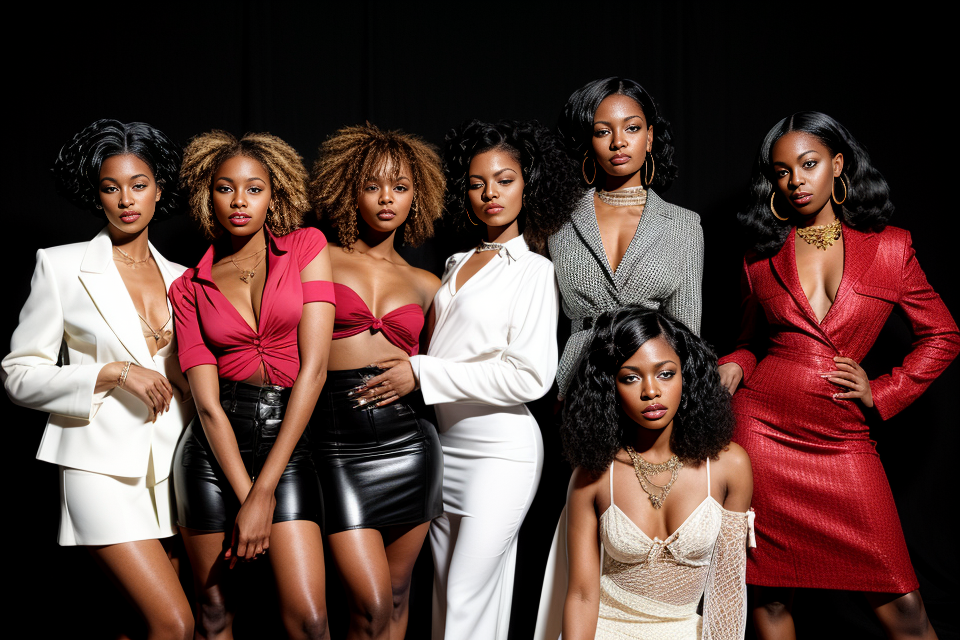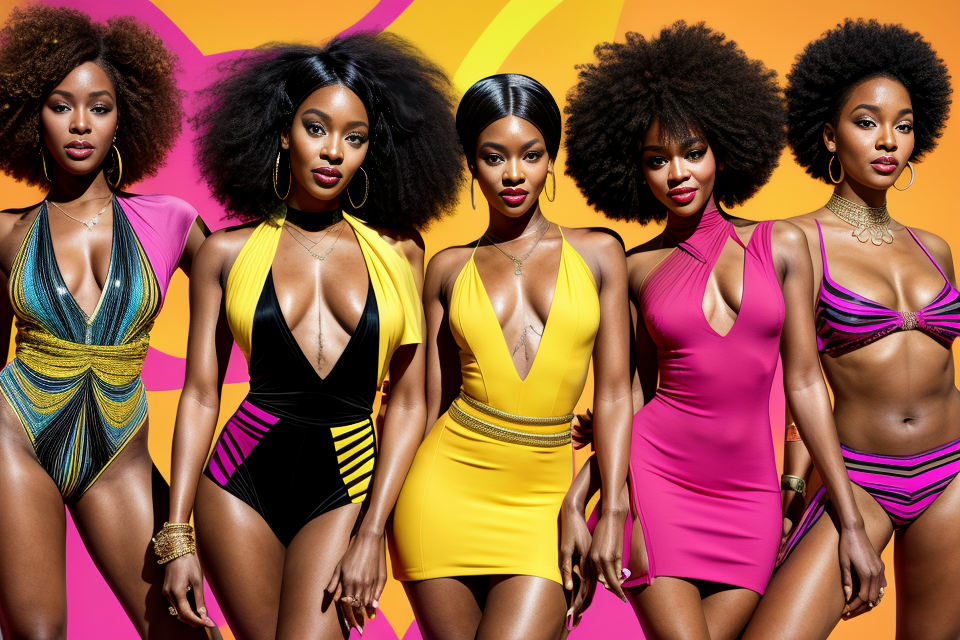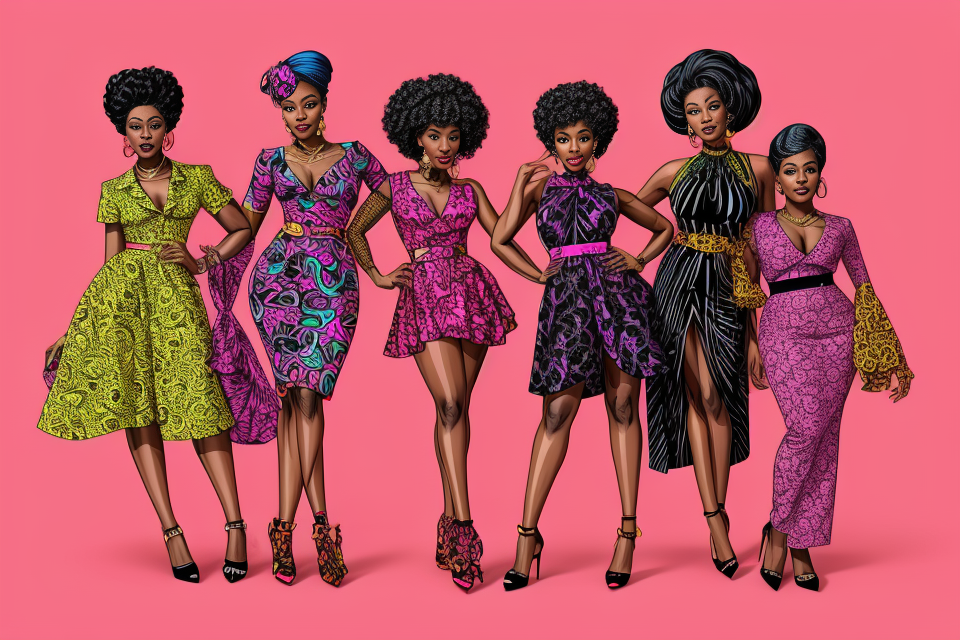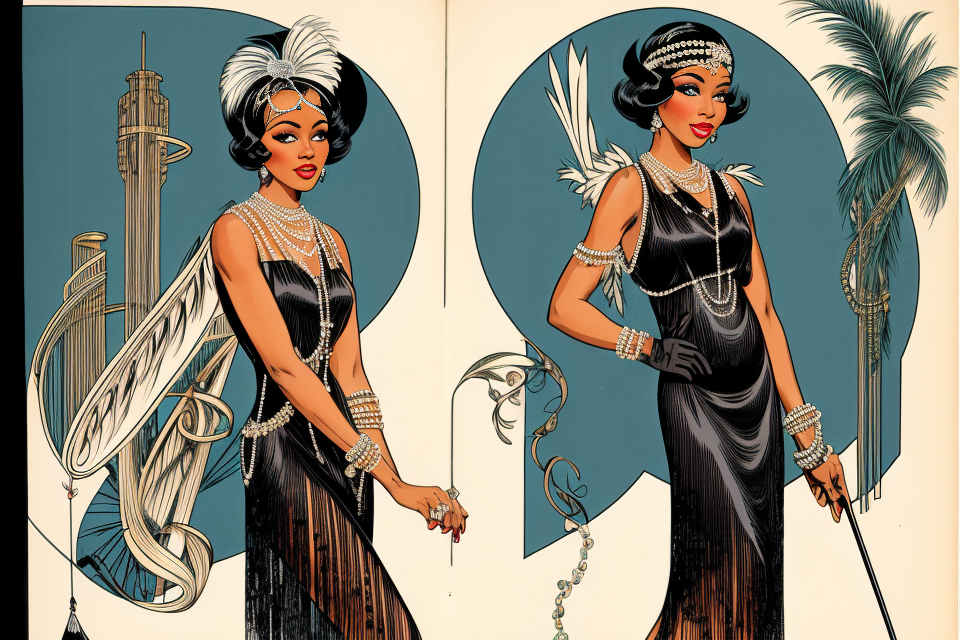Y2K fashion trend, also known as the “millennium look,” was a popular style in the late 1990s and early 2000s, characterized by bright colors, glitter, and futuristic shapes. The trend was a reflection of the optimism and excitement surrounding the turn of the millennium. But who was responsible for starting this iconic look? Did black women really kick off the Y2K fashion trend? In this article, we will explore the origins of the Y2K fashion trend and the role that black women played in its inception. So, buckle up and get ready to find out the truth behind this fascinating fashion phenomenon.
It is difficult to say definitively whether black women started the Y2K fashion trend. However, it is true that black women have historically been at the forefront of fashion trends and have often been influential in shaping popular styles. It is also worth noting that the Y2K trend was heavily influenced by 1990s fashion, which was a time when black women were making significant strides in the fashion industry and were featured prominently in magazines and on runways. Additionally, the Y2K trend was characterized by a focus on bold, colorful, and playful fashion, which is a style that has often been embraced by black women. Ultimately, while it is impossible to say for certain who started the Y2K trend, it is clear that black women have played a significant role in shaping and influencing fashion trends over the years.
The Origins of Y2K Fashion
The Emergence of a New Style
The Y2K fashion trend emerged as a response to the aesthetics of the late 1990s, which were characterized by a grunge and hip-hop influenced style. The early 2000s saw a shift towards a more polished and sophisticated look, with an emphasis on luxury brands and high-end fashion.
This new style was heavily influenced by celebrities and the fashion-forward stars of the early 2000s, such as Paris Hilton, Britney Spears, and Jennifer Lopez. These women popularized a glamorous and sexy look, characterized by low-rise jeans, tight-fitting tops, and cleavage-enhancing dresses.
The Y2K fashion trend also saw a rise in the popularity of denim, with low-rise jeans becoming a staple of the era. Other key elements of the trend included platform shoes, mini skirts, and statement accessories such as belts and chunky jewelry.
In addition to these fashion-forward trends, the Y2K era also saw a rise in the popularity of fast fashion and affordable clothing options, with brands such as Zara and H&M becoming popular among young people. This democratization of fashion made it possible for individuals from all walks of life to participate in the Y2K fashion trend, regardless of their budget or economic status.
Overall, the emergence of the Y2K fashion trend marked a significant shift in the fashion industry, moving away from the grunge and hip-hop influenced styles of the late 1990s and towards a more polished and sophisticated aesthetic. This new style was characterized by a focus on luxury brands, celebrity-inspired looks, and a rise in fast fashion options, making it accessible to a wider audience than ever before.
The Impact of Technology on Fashion
Technology has always played a significant role in shaping fashion trends. With the advent of the internet and social media platforms, fashion trends have become more accessible and widespread than ever before. The early 2000s saw a rise in the use of technology in the fashion industry, which played a significant role in the development of the Y2K fashion trend.
One of the key factors that contributed to the rise of Y2K fashion was the widespread adoption of digital cameras and smartphones. These devices made it easier for people to take and share photos of their outfits, which in turn led to a greater focus on personal style and self-expression. This was particularly true for young people, who were more likely to use social media platforms like MySpace and Tumblr to share their fashion choices with others.
Another way in which technology impacted Y2K fashion was through the rise of fast fashion. As online retailers like Zara and H&M began to dominate the market, consumers were able to stay on top of the latest trends without having to spend a fortune on designer clothing. This made it easier for people to experiment with different styles and colors, which in turn helped to fuel the Y2K fashion trend.
Finally, technology also played a role in the globalization of fashion. With the internet making it easier than ever before to access fashion from around the world, people were exposed to a wider range of styles and influences. This helped to break down cultural barriers and encouraged the mixing and matching of different fashion elements, which is a key characteristic of the Y2K aesthetic.
Overall, the impact of technology on fashion during the early 2000s was significant, and played a major role in the development of the Y2K fashion trend.
The Role of Black Women in Y2K Fashion
The Contributions of Black Designers
The contributions of black designers to the Y2K fashion trend cannot be overstated. They played a significant role in shaping the aesthetic of the era, bringing their unique perspectives and experiences to the forefront of the fashion industry. Here are some of the ways in which black designers contributed to the Y2K fashion trend:
- Innovative Designs: Black designers were at the forefront of the Y2K fashion trend, creating innovative designs that challenged traditional fashion norms. Designers like Tracy Reese, Kimora Lee Simmons, and Andrea Jung, among others, introduced unique and daring styles that became iconic of the era.
- Emphasis on Diversity: Black designers played a key role in promoting diversity in the fashion industry, which was traditionally dominated by white designers. They showcased a wide range of body types, skin tones, and hair textures, which helped to redefine beauty standards and make the fashion industry more inclusive.
- Collaborations with Popular Brands: Many black designers collaborated with popular fashion brands during the Y2K era, helping to bring their unique designs to a wider audience. Collaborations between designers like Missy Elliott and Candie’s, and between Sean Combs and Versace, helped to bring the Y2K aesthetic to the masses.
- Influence on Streetwear: Black designers were also instrumental in shaping the streetwear trend that emerged during the Y2K era. Brands like FUBU, which was founded by Daymond John, became hugely popular and helped to establish streetwear as a legitimate fashion category.
- Fashion Activism: Black designers used their platforms to promote social and political causes during the Y2K era. Designers like Kara Walker, who created provocative and politically charged fashion statements, helped to raise awareness about important issues and challenge societal norms.
Overall, the contributions of black designers to the Y2K fashion trend were significant and helped to shape the aesthetic of the era. Their innovative designs, emphasis on diversity, collaborations with popular brands, influence on streetwear, and fashion activism all played a key role in defining the Y2K fashion trend.
The Influence of Black Culture on Y2K Fashion
Black culture has always been a significant force in shaping fashion trends, and the Y2K era was no exception. Black women, in particular, played a crucial role in popularizing the trends that defined the era.
One of the key factors that contributed to the influence of black culture on Y2K fashion was the rise of hip-hop and R&B music. These genres, which were dominated by black artists, became mainstream in the late 1990s and early 2000s, and their impact on fashion was immense.
Hip-hop and R&B artists often incorporated fashion into their music videos and performances, showcasing the latest trends and styles. As a result, many young people, particularly black women, emulated the looks they saw on their favorite artists.
Another important factor was the rise of black-owned fashion magazines and websites, which provided a platform for black designers and stylists to showcase their work. These publications also highlighted the contributions of black women to the fashion industry, providing a much-needed voice for underrepresented communities.
In addition, black women have always been innovative when it comes to fashion, and their ability to mix and match different styles and influences helped to create the unique aesthetic of Y2K fashion. For example, the popularity of velour tracksuits, which were often worn with high heels and designer handbags, was largely driven by black women who used the look to express their individuality and style.
Overall, the influence of black culture on Y2K fashion cannot be overstated. From music to magazines, black women played a critical role in shaping the trends and styles of the era, and their contributions continue to inspire fashion designers and stylists today.
The Y2K Fashion Trend Today
Revival of Y2K Fashion
In recent years, there has been a resurgence of interest in Y2K fashion trends. This has led to a revival of the style, with many designers and retailers embracing the aesthetic.
One of the main reasons for the revival of Y2K fashion is the nostalgia factor. Many people who grew up in the late 1990s and early 2000s are now in their 20s and 30s, and they are looking for ways to reminisce about their youth. The fashion trends of the Y2K era bring back fond memories for many people, and they are eager to incorporate them into their wardrobes.
Another reason for the revival of Y2K fashion is the cyclical nature of fashion. Fashion trends tend to come back into style every few years, and the Y2K aesthetic is no exception. In addition, the rise of social media has made it easier for people to stay up-to-date on the latest fashion trends, and the Y2K style has gained a lot of attention online.
The revival of Y2K fashion has also been influenced by the rise of streetwear and athleisure. Many of the Y2K fashion trends, such as cargo pants and oversized t-shirts, are comfortable and practical, making them a natural fit for the current fashion landscape.
Overall, the revival of Y2K fashion is a testament to the enduring appeal of the style. It has been embraced by designers, retailers, and consumers alike, and it shows no signs of going out of style anytime soon.
The Continued Relevance of Y2K Fashion for Black Women
- Y2K fashion trends continue to influence modern fashion today, particularly in the realm of streetwear and urban fashion.
- Black women have been instrumental in popularizing and reinterpreting Y2K trends, making them their own and incorporating them into their personal styles.
- The continued relevance of Y2K fashion for black women can be attributed to a number of factors, including:
- The enduring appeal of nostalgia and retro-inspired styles.
- The importance of fashion as a form of self-expression and cultural identity.
- The impact of social media and influencers in shaping fashion trends and promoting Y2K-inspired looks.
- The role of black women in driving and influencing fashion trends, both historically and in the present day.
- In addition to these factors, the continued relevance of Y2K fashion for black women can also be seen in the way that these trends have been reinterpreted and adapted to suit contemporary tastes and styles.
- For example, the trend for minimalist and monochromatic looks has been updated with bold and bright colors, while oversized silhouettes and chunky footwear have been reimagined with a more refined and polished aesthetic.
- Overall, the continued relevance of Y2K fashion for black women is a testament to the enduring appeal of these styles and the importance of fashion as a form of self-expression and cultural identity.
The Impact of Y2K Fashion on the Fashion Industry
The Lasting Legacy of Y2K Fashion
Although the Y2K fashion trend emerged more than two decades ago, its influence on the fashion industry is still evident today. This section will explore the lasting legacy of Y2K fashion and how it has shaped the fashion industry in the 21st century.
Revival of 2000s Fashion
One of the most significant legacies of Y2K fashion is the recent revival of 2000s fashion trends. Many fashion brands and retailers have embraced the aesthetics of the early 2000s, incorporating iconic styles such as low-rise jeans, Juicy Couture tracksuits, and chunky highlights into their collections. This resurgence of Y2K fashion has been driven by a combination of nostalgia and a desire for a more playful and expressive approach to dressing.
Influence on Contemporary Fashion
The Y2K fashion trend has also had a profound influence on contemporary fashion, particularly in terms of its impact on streetwear and athleisure. The rise of brands such as Supreme and Off-White has been driven in part by a fascination with 2000s hip-hop culture and the fashion choices of celebrities such as Jay-Z and Beyoncé. Similarly, the popularity of sneaker culture and oversized silhouettes can be traced back to the Y2K era.
Embrace of Diversity and Inclusivity
Finally, the Y2K fashion trend has had a lasting impact on the fashion industry’s approach to diversity and inclusivity. The popularity of Y2K fashion among black women helped to challenge traditional beauty standards and paved the way for a more inclusive and diverse fashion industry. Today, many fashion brands and retailers are committed to representing a wider range of body types, ages, and ethnicities in their marketing and advertising campaigns.
Overall, the lasting legacy of Y2K fashion can be seen in the continued influence of its aesthetics on contemporary fashion, as well as its impact on the fashion industry’s approach to diversity and inclusivity. While the trend may have originated with black women, its influence has been felt across the fashion industry as a whole, reshaping the way that we think about fashion and beauty in the 21st century.
The Future of Y2K Fashion
- Y2K fashion has had a lasting impact on the fashion industry, and its influence can still be seen today.
- Many designers have incorporated Y2K elements into their collections, and high-end fashion houses have even created entire lines inspired by the trend.
- The Y2K fashion trend has also had an impact on streetwear and fast fashion, with many brands incorporating Y2K-inspired designs into their collections.
- As a result, Y2K fashion has become a mainstay in the fashion industry, and it is likely to continue to influence future trends.
- However, it is important to note that the Y2K fashion trend was not created by a single group of people, and it is unfair to credit or blame any one group for its rise to popularity.
- Instead, the trend was a product of its time, and it was influenced by a variety of factors, including the rise of the internet, the influence of popular culture, and the changing attitudes towards fashion.
- Therefore, while black women may have played a significant role in popularizing Y2K fashion, it is important to recognize that the trend was not created by them alone.
- It is also important to note that the future of Y2K fashion is not limited to any one group of people, and it is likely to continue to evolve and change as new influences and trends emerge.
The Criticisms of Y2K Fashion
The Problem with Fast Fashion
The Y2K fashion trend, characterized by its bright colors, bold patterns, and nostalgic references to the 1990s and early 2000s, has been widely criticized for its role in perpetuating fast fashion. Fast fashion is a term used to describe the mass production of clothing at low costs, often using low-quality materials and exploitative labor practices.
One of the main problems with fast fashion is its impact on the environment. Fast fashion relies on rapid production cycles and high volumes of production, which lead to excessive waste and pollution. For example, it is estimated that the fashion industry is responsible for 10% of global carbon emissions, largely due to the use of non-sustainable materials and the transportation of goods.
Fast fashion also has a negative impact on workers, particularly those in developing countries. Many fast fashion brands rely on outsourcing production to countries with low labor standards, where workers are often paid low wages and work in poor conditions. In addition, fast fashion companies have been known to use unethical practices such as child labor and forced labor.
Furthermore, fast fashion perpetuates a culture of disposability, where consumers are encouraged to buy cheap, poorly made clothes that they will quickly discard in favor of the latest trend. This contributes to a vicious cycle of waste and encourages consumers to prioritize style over quality and durability.
In summary, the problem with fast fashion is multifaceted and includes environmental, social, and ethical concerns. The Y2K fashion trend, with its focus on mass-produced, trend-driven clothing, has been criticized for perpetuating this problematic industry.
The Environmental Impact of Y2K Fashion
Y2K fashion, with its focus on fast fashion and trend cycling, has had a significant environmental impact. The production of clothing in the 2000s was characterized by high levels of waste, pollution, and resource depletion. The fast fashion model, which emphasized rapid production and consumption, resulted in a massive increase in textile waste.
Fast fashion brands rely on low-wage labor in developing countries, where workers often face poor working conditions and low wages. This exploitation of labor has led to the destruction of local economies and the displacement of traditional textile industries. Additionally, the use of synthetic materials in Y2K fashion has contributed to the microplastic pollution in oceans and waterways.
The environmental impact of Y2K fashion is a significant concern, and it is important to consider the sustainability of our fashion choices. As consumers, we must take responsibility for our consumption habits and make conscious decisions about the clothing we buy and dispose of. The Y2K fashion trend may have been popular, but it is essential to acknowledge its environmental costs and work towards a more sustainable future for fashion.
The Final Word on the Y2K Fashion Trend
It is widely accepted that the Y2K fashion trend was a reaction to the grunge and minimalist styles of the 1990s. However, there are criticisms of the trend, particularly regarding its association with consumerism and the superficiality of the fashion industry. Some argue that the trend was simply a marketing ploy to sell clothes, and that it did not have any real cultural significance.
However, it is important to note that the Y2K trend was not just a fashion trend, but a cultural phenomenon that reflected the optimism and hope for the future that many people felt at the turn of the millennium. The trend was not just about wearing certain clothes or having certain accessories, but about embracing a lifestyle and an attitude. It was a celebration of youth, femininity, and fun, and it allowed people to express themselves in a way that was not possible before.
Moreover, it is important to recognize the role that black women played in popularizing the Y2K trend. They were not just passive consumers of fashion, but active participants in creating and defining the trend. They took the styles and aesthetics of the trend and made them their own, incorporating them into their own unique personal styles. This was not just about wearing certain clothes, but about expressing themselves and their identities in a way that was authentic and empowering.
In conclusion, while there are criticisms of the Y2K fashion trend, it is important to recognize its cultural significance and the role that black women played in popularizing it. The trend was not just a marketing ploy, but a reflection of the hopes and dreams of a generation. It was a celebration of youth, femininity, and fun, and it allowed people to express themselves in a way that was not possible before.
The Enduring Appeal of Y2K Fashion for Black Women
Y2K fashion, also known as “millennial fashion,” refers to the fashion trends of the late 1990s and early 2000s. The trend was characterized by a mix of retro and futuristic styles, including low-rise jeans, mini skirts, and metallic accessories.
One of the criticisms of Y2K fashion is that it was largely influenced by the fashion choices of wealthy, white celebrities and models. This led to accusations of cultural appropriation and a lack of diversity in the fashion industry.
However, for many black women, Y2K fashion represented a unique opportunity to express their personal style and push back against traditional beauty standards.
Black women have long been excluded from mainstream fashion and beauty ideals, with white models and celebrities dominating the industry. Y2K fashion provided a much-needed alternative, with black women embracing the trend and making it their own.
The enduring appeal of Y2K fashion for black women can be attributed to several factors. For one, the trend allowed for a level of self-expression and creativity that was previously unavailable. Black women were able to experiment with bold colors, patterns, and textures, pushing the boundaries of traditional fashion norms.
Additionally, Y2K fashion was a form of resistance against the narrow beauty standards imposed on black women. The trend allowed for a celebration of all body types, with emphasis on curves and a more inclusive approach to beauty.
Finally, Y2K fashion provided a sense of community and belonging for black women. The trend was embraced by a wide range of black women, from celebrities to everyday individuals, creating a shared experience and sense of identity.
Overall, the enduring appeal of Y2K fashion for black women is a testament to the power of fashion as a form of self-expression and resistance. The trend allowed for a level of creativity and individuality that was previously unavailable, and provided a sense of community and belonging for black women.
FAQs
1. What is Y2K fashion?
Y2K fashion refers to the trend of wearing clothing and accessories inspired by the styles of the late 1990s and early 2000s. This trend is characterized by a mix of bold colors, chunky shoes, mini skirts, and oversized denim.
2. Who started the Y2K fashion trend?
The origins of the Y2K fashion trend are difficult to trace, as it was a global phenomenon influenced by many different factors. However, it is true that black women played a significant role in popularizing the trend, particularly in the early 2000s.
3. Why did black women start the Y2K fashion trend?
Black women were instrumental in promoting the Y2K fashion trend due to their innovative and creative approach to fashion. They embraced the trend as a way to express their individuality and showcase their unique style. Additionally, the Y2K trend offered a welcome departure from the more conservative fashion of the past, and black women were at the forefront of this movement.
4. How did black women influence the Y2K fashion trend?
Black women played a major role in promoting the Y2K fashion trend through their influence on social media, fashion blogs, and runway shows. They showcased the trend in their own unique way, incorporating it into their everyday style and inspiring others to do the same. This helped to solidify the Y2K trend as a lasting fashion movement.
5. Is the Y2K fashion trend still popular today?
Yes, the Y2K fashion trend continues to be popular today, with many designers and retailers incorporating elements of the trend into their collections. The trend has evolved and adapted to suit contemporary tastes, but the core principles of bold colors, statement accessories, and oversized silhouettes remain.



